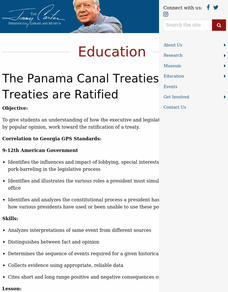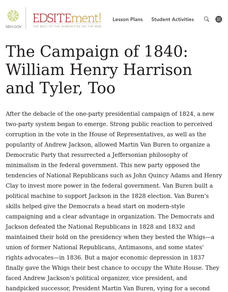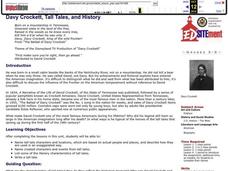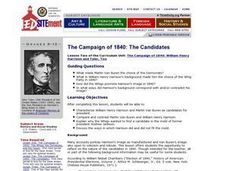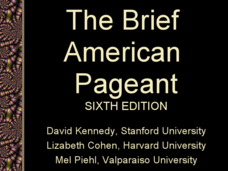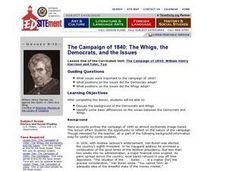Curated OER
Our Country
Second graders study about being a citizen in a democracy. They also study about the important American symbols and the process for electing the President. Students develop a creative writing story and create a drawing of a room....
Curated OER
"The Election"
Learners participate in an election for the purpose of comprehending the political process and the responsibilities that come with citizenship in a free society. They elect officials with no identity and are surprised with the revealing...
Curated OER
Campaign 2004: Classroom Electorate
High schoolers role play as political analysts first forecasting the electoral college vote in a presidential election and then, following the results of the actual count. They study the role of swing states, and why political...
Curated OER
Bill of Rights -- Texas v. Johnson, 1989
Learners examine the First Amendment of the Bill of Rights. During a visit to the George Bush Presidential Museum, they watch a video about the Texas v. Johnson flag burning case. In groups, they discover the role of the Supreme Court...
Curated OER
The Panama Canal Treaties: How Treaties Are Ratified
Students gain an understanding of how the executive and legislative branches, influenced by popular opinion, work toward the ratification of a treaty. They examine the influences and impact of lobbying and special interests in the...
Carolina K-12
Exploring the Electoral College
Does your vote really count? This activity helps young voters learn about the electoral college through a TED talk, a helpful handout, discussion prompts, and then a role-playing activity that has participants simulating an election on a...
Curated OER
The Campaign of 1840: William Henry Harrison and Tyler, Too
High schoolers list some issues important during the campaign of 1840. They compare and contrast the careers of Martin Van Buren and William Henry Harrison before they became president and explain why the Whigs wanted to find a candidate...
Curated OER
Stage a Debate: A Primer for Teachers (Lincoln-Douglas Debate Format)
For a comprehensive overview of debate styles and formats, look at this resource. It details the Lincoln-Douglas debate format (one-to-one debate with specific, timed rounds of points, cross-examination, and rebuttals). You can also find...
Curated OER
Born on a Mountaintop? Davy Crockett, Tall Tales, and History
Students compare and contrast the details from the life of the real David Crockett and the legendary folk hero he later became. They identify the characteristics of a tall tale and follow a rubric to create a tall tale of their own.
ProCon
Electoral College
The Electoral College's role in elections is sometimes confusing and controversial. Pupils use a debate topics website to research the pros and cons of the practice to debate whether the United States should still use the Electoral...
Curated OER
Andrew Jackson: 1767-1845
A thorough examination of Andrew Jackson's presidency and politics, these slides contain important facts and pictures of the growing United States. Events such as the Trail of Tears and the Tariff Battles of the early 19th century are on...
Curated OER
Fill-In : March Events in the News
What happened on March 13, 1868? What happened on March 21, 1965? Eager readers fill in the missing historical event occurring on one day in March from 1862 - 1995. There are 31 events each occurring on a different day in March. This is...
Illustrative Mathematics
Electoral College
A cross-curricular resource that takes the electoral votes and allows your learners to organize and analyze the data. Young voters can determine which states are more influential and interpret the dotplot provided for more data....
National Endowment for the Humanities
The 1828 Campaign of Andrew Jackson: Changes in Voting Participation
Students give examples to indicate how voting participation changed in the first half of the 19th century, and make connections between changes in voting participation and the results of the election of 1828.
National Endowment for the Humanities
The 1828 Campaign of Andrew Jackson: Expansion of the Voting Base
Students give examples to indicate how the franchise was extended and limited in the first half of the 19th century, and cite some differences in the newly enfranchised population that could affect the way they would vote.
Curated OER
Cristina Kirchner: Famous People (ELL Assignment)
This lengthy assignment for English language learners includes a one-page reading on the Argentinian president, Cristina Kirchner, and numerous activities/exercises that address listening and reading comprehension, speaking, vocabulary...
Newseum
Decoding an Editorial Cartoon
What advantages do political cartoons have over written editorials? Scholars discuss the topic by exploring editorial cartoons. Working in small groups, pupils analyze an Uncle Sam cartoon and complete a worksheet. As a fun extension,...
Curated OER
The Election Is in the House: Was There a Corrupt Bargain?
Students take a stand, supported by evidence, on whether there was a "corrupt bargain" between Henry Clay and John Quincy Adams.
Curated OER
The Campaign of 1840: The Campaign
High schoolers discuss the use of visual images, objects, and spectacle in the 1840 campaign, then take a stand: Was the campaign of 1840 based more on substance or image?
Curated OER
The Campaign of 1840: The Candidates
Students compare and contrast William Henry Harrison and Martin Van Buren as candidates for president. They explain why the Whigs wanted to find a candidate in the mold of former president Andrew Jackson and discuss whether Harrison fit...
Curated OER
The Brief American Pageant: Drifting Toward Disunion
A series of maps take viewers through the Antebellum period in American history. Focusing on the elections of Buchanan and Lincoln, as well as the Southern opposition to secession, the slideshow would make a good companion to a lecture...
Curated OER
The Brief American Pageant: The Politics of Boom and Bust
Prior to 1929, the Roaring Twenties were a great time to be alive and to spend money. These slides would be a good transition into a unit on the Great Depression. It presents five images about the political and financial context of the...
Curated OER
Mr. Lincoln's Whiskers
Students compose a letter to a family member. In this writing lesson, students listen to the book, Mr. Lincoln's Whiskers and identify the parts of a letter.
Curated OER
The Campaign of 1840: The Whigs, the Democrats, and the Issues
High schoolers reflect on the nature of the campaign of 1840. They identify the positions of the Democrats and the Whigs and their basic differences.






